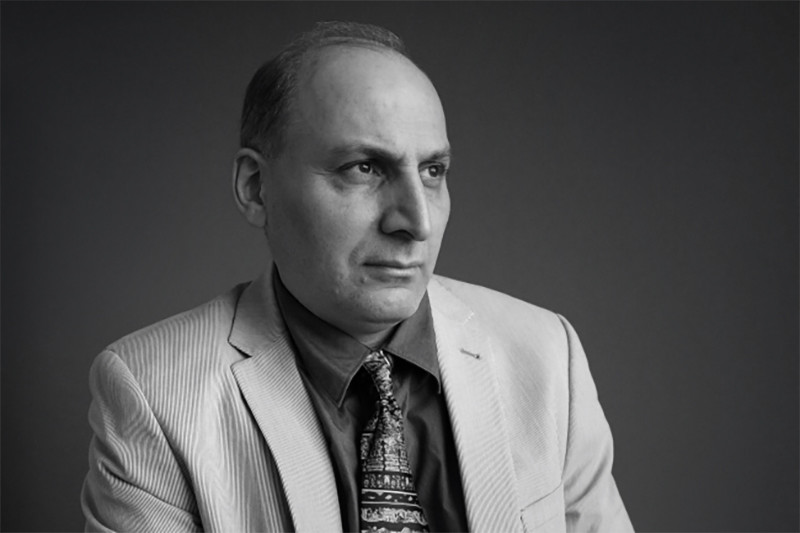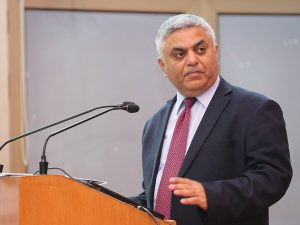
- “You can’t be an armchair philosopher or an artist. You have to go out and struggle with life to make it stimulating and add meaning through your work. You just can’t be a passive observer to life.”
- “As a lawyer you have to fight for truth and justice; there is a heroic side to it.”
- “You need to pay attention to the otherness of others for an unbiased view.”
- “As educators our job is also to go beyond taboos.”

When you hear such thought provoking words, you know you are talking to a revolutionary, a philosopher and an agent of change himself. Luckily, Ramin Jahanbegloo, who holds Canadian and Iranian passports, is also an academic spreading the good word amongst students all over the world. Luckier is the fact that for the past two years he has been the Professor and Vice Dean, Jindal Global Law School at JGU and the Director of its Mahatma Gandhi Center for Peace and Non-Violence.
Having lived through the revolution in Iran, fighting against the Shah regime, and thereafter making home in 7 different countries, Prof. Jahanbegloo has a unique perspective on the world. But his passion for learning, meeting other influencers and sharing his ideas continues to “make his life meaningful”. He has written 27 books in English, French, Spanish, Italian and Persian, three in the last year itself. Interestingly he also teaches a course ‘Law and lawyers in American movies’ and indulges in lighthearted banter, open friendships with students. Intrigued? Read on.
The India connect and Gandhi influence

The son of an artist mother and an Economist father, Prof. Jahanbegloo studied in Switzerland, UK, Algeria and Iran till the age of 17. He recalls India always being present in his home through friends, books by Tagore, Mahatma Gandhi, etc. “My parents knew the Indian ambassador well and had already visited the country with an invitation from Indira Gandhi’s office. I started reading about Gandhi because non-violence was an important concept for me. But at the age of 17, I went to France because I wanted to become a doctor; medical humanism was always with me,” he reminisces.
The land of liberte, egalite and fraternite strengthens his ideologies
From the radical regime in Iran to being surrounded by Marxists and Anarchists friends and Professors in Paris led to interesting discussions on ideologies. Later in 1978-79, Prof. Jahanbegloo fought the Shah’s regime in Iran as a student. But he didn’t associate with any political party and was steadfast in his belief for non-violence. In his early 20s he started working closely with a French non-violent group. “An Indian delegation in UNESCO saw my work around Gandhi and invited me to visit India. I traveled around for a month, spoke to Gandhians in their 90s who had gone to prison during emergency. I wrote those interviews in an article for a French magazine and decided to work extensively in the field,” he says.
The relentless learner, thinker, writer and guide

Prof. Jahanbegloo carried on his work on the topic through his dissertation and several books. Only last year he published two books on Gandhi. He has also written several books that are conversations with the best philosophers, writers, artists of the 21st century. “One thing I can’t stand is mediocrity. The world today is more complacent, conformist and mediocre than the one I grew up in. I tell my students they have to go and struggle with life. Everyone wants to be a corporate lawyer, but there is a sense of romanticism to law. It’s completely absent in 21st century and we need to fight for it,” he adds passionately.
Bringing about change- one movement at a time
Prof. Jahanbegloo has fought for democracy, started ‘Students for Peace’, first in Latin America and now in India, and is steady in his efforts to make a difference. He admits that for him the worst thing is to come into the world and lead a meaningless life. His work with JGLS, the centre and interactions with students’ minds in the country gives him the meaning he looks for. “Students are not stupid, they are lazy, and you see that often with those who come from privilege. But putting effort is maturing in life. I ask my students to participate, not cheat because it is an insult to their talents,” he says.
Besides the Students for Peace movement, theMahatma Gandhi Center for Peace and Non-Violence also runs Schooling Nonviolence programme where students teach kids of labourers. With talks at conferences around the world, collaborations and his writing, Prof. Jahanbegloo remains at the heart of it, just like he would like to.

